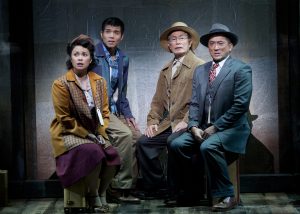When Looking Different Was a Crime
It probably seemed like the right security thing to do at the time, locking 120,000 West Coast Japanese-Americans into concentration camps early in World War II. But 70 years later, it seems a shocking and shameful mistake.
The ensuing mess – trampled civil rights, brutal economic ruin, senseless bully tactics and cruel cultural chaos – never produced an ounce of national security that I’ve heard about and the impact is still being worked out. Thus the new musical Allegiance, now in its world premiere at the Old Globe Theatre.
Though aglow with good intentions and driven by righteous energy, the work lumbers where it should float. Perhaps this is simply too large and too complex a story to tell within the limitations of musical theatre.

Lea Salonga, Telly Leung, George Takei and Paul Nakauchi, left to right, in the Old Globe’s Allegiance. Henry DiRocco Photo
Jay Kuo’s songs are rousing, reflective or romantic as required, touched delicately by a Japanese flavor but never leaving the musical theatre mainstream. Kuo joined Marc Acito and Lorenzo Thione in fashioning the book, a complicated mixture of personal, patriotic and political stresses that leaves a familiar aftertaste of ethnic issues through the ages.
Maybe the cast needs to be either larger or smaller. There just aren’t enough people for these mobs, battles, baseball games, dances and such, especially when the script often demands groups with two separate ethnic looks, Asian and Other. If all this grand sweep of history was left offstage and the play focused down to its essence, it might be done with nine instead of 19 players. But this way, it needs closer to 29.
Without brooding over body types, it is possible to say that the casting mostly works. The members of the core family – the Kimuras, ripped from their farm near Salinas by armed guards and hauled to the desert with only what they can carry – may be familiar types but each is fully inked in. Telly Leung is a bright, bouncy survivor as the ambitious son Sammy and Lea Salonga brings a lovely true voice and womanly warmth to the role of the older sister. Paul Nakauchi uses poise and tightly-bound rage to represent the proud father, whose motto is gaman, translated as “endurance with dignity” and transformed by Kuo into the family anthem.
But dignity often seems the exclusive property of George Takei, who centers the entire enterprise as the Kimura grandfather, a magistral mix of wisdom and drollery, and as the elderly son in flash-forwards of 60 years later.
Director Stafford Arima has given Takei one of the most gently appealing death scenes in long theatrical memory. He has found other such savory moments, from his bewildered crowd at a railroad station to his quiet revelation scene near the end, but most of the way he must push, push the story onward, using his small ensemble to cover dozens of parts.
Michael K. Lee, trying hard for nuance, flickers as a student resistance leader and Paolo Montalban simply dials in hustling idealist as the high-profile national leader of loyal Japanese-Americans, a role far too complex to stuff into a musical. Allie Trimm gets a couple of good duets and some soulful gazing as the Quaker nurse who falls for Sammy Kimura.
The best songs are specialties, such as a swinging victory strut for a girl and three boys from the ensemble and Michael K. Lee’s sarcastic “Paradise,” describing the camp in the wastes of Wyoming. And it’s not a coincidence that both of these make good use of Andrew Palermo’s choreography, which never lets the show down, regardless of the resources available. Or not.
Perhaps the most artistic single element of the show is Donyale Werle’s magnificent set, an assortment of screens and drops which, washed with Howell Binkley’s delicate lighting and Darrel Maloney’s superb projections, becomes several dozen convincing locales of wide assortment, from vast wastelands to San Francisco streets. The battlefield worked because of Jonathan Deans’ sound. The best that can be said of Alejo Vietti’s costumes, though, is that they don’t pull actual groans from old memories. (But, please, study those uniform references more closely, hmmm?)
These relocation camps are a carbuncle on the body of American history, true, but there are worse, all potential learning opportunities. I’m not sure this play wants more than acknowledgement, which it earns. But it also can be taken as a warning against cultural stereotyping. And, perhaps, against over-reactions such as, let’s say, continuing strip searches of airline passengers years after a catastrophe.
[box] Allegiance, a new musical by Jay Kuo, Marc Acito and Lorenzo Thione, will be presented by the Old Globe Theatre at 7 p.m. Tuesdays, Wednesdays and Sundays; at 8 p.m. Thursdays, Fridays and Saturdays; and at 2 p.m. Saturdays and Sundays through Oct. 28.
DOWNLOAD CAST LIST HERE [/box]

Welton Jones has been following entertainment and the arts around for years, writing about them. Thirty-five of those years were spent at the UNION-TRIBUNE, the last decade was with SANDIEGO.COM.



Welton Jones has every right to his opinion, but shouldn’t comments be well researched and not written off the cuff? His recent review of Allegiance is insulting to the costume designer “(But, please, study those uniform references more closely, hmmm?)” But it is most insulting to veteran expert George Peterson who consulted on all the uniforms, etc. I follow George Takei on FaceBook (as do 2.4 million others) and he showed a picture of him in his Allegiance uniform in a post on 9/11/12. There he notes George Peterson and says you can find out more at http://www.nchsinc.com/aboutgeorge.html Welton is way off base in his insulting comment about designer Vietti – Welton retired once – if he is not to the task of doing responsible reviews, maybe he should retire again?